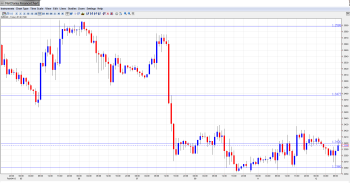EUR/USD continues to trade quietly, continuing the trend we saw on Monday (February 10th). The euro has had a tough time trying to stay above the 1.34 line, and is trading in the 1.3370 range. With little happening as far as economic releases in both Europe and the US, Tuesday’s highlight will be a speech by ECB head Mario Draghi, who will address the Spanish Parliament in Madrid. In the US, the major release is the Federal Budget Balance.
EUR/USD Technical
- Asian session: Euro/dollar was quiet, touching a low of 1.3378, and consolidated at 1.3385. The pair is unchanged in the European session.
- Current range: 1.3360 to 1.34.
Further levels in both directions:
- Below: 1.3360, 1.3290, 1.3255 , 1.3170, 1.3130, 1.3110, 1.3030, 1.30 and 1.2960.
- Above: 1.34, 1.3480, 1.3588, 1.3690, 1.3740, 1.3860, 1.3915 and 1.40.
- 1.34 continues to provide resistance. 1.3480 is stronger.
- 1.3360 is a weak support level. This line could see activity if the euro loses ground. 1.3290 is the next support level.
Euro/dollar steady ahead of Draghi speech in Madrid – click on the graph to enlarge.
EUR/USD Fundamentals
- All Day: Eurozone ECOFIN Meetings.
- 12:30 US NFIB Small Business Index. Exp. 89.0 points.
- 14:30 ECB President Mario Draghi Speaks. Draghi will address the Spanish Parliament.
- 16:30 FOMC Member Esther George Speaks.
- 19:00 US Federal Budget. Exp. -4.6B.
For more events and lines, see the Euro to dollar forecast
EUR/USD Sentiment
- Draghi visits Spain: The markets will be paying close attention as ECB head Mario Draghi pays a visit to Spain, in which he will address the Spanish Parliament. Draghi has been in the spotlight quite a bit in 2013. In January, the euro rallied after Draghi expressed optimism about the Eurozone economy. Speaking after the ECB rate announcement last week, Draghi once again lit a fire under the currency, only this time in the opposite direction. Draghi warned that the high-flying euro was affecting prices and economic growth in the Eurozone. He stated that the exchange rate was not a policy target, but the ECB would “closely monitor money market developments”. The result? The euro plunged, losing over a cent. We’re unlikely to get such a dramatic response from the currency markets this time around, but the markets will be listening closely to what Draghi has to say.
- G20 urged to avoid currency wars: The G20 meets in Moscow later this week, and an important topic on the agenda will be the issue of exchange rates. There has been a lot of volatility in currency rates lately, most notably, the sinking yen and the high-flying euro. There is mounting concern about currency wars, as countries are increasingly relying on monetary policy to kick-start their flagging economies. The Institute of International Finance, which is comprised of leading banks and financial institutions, has urged the G-20 to take steps to avoid the “possible discord on exchange rates”. However, given the need to reach a consensus, analysts expect any statement on currencies from the G-20 to be mild in nature.
- EU Agrees to Budget Cuts: After marathon negotiations in Brussels, EU leaders have hammered out a deal to cut the EU budget, for the first time in the bloc’s history. The seven-year budget is being trimmed from the current 994 billion euros to 960 billion. The cuts are modest in scale, but nonetheless an important step in reigning in spending. The deal is a hard-fought compromise, as it reduces the budget while providing more funds for agricultural aid. Although all EU leaders have signed off on the agreement, it must be approved by the European Parliament, which is by no means certain. European Parliament head Martin Schulz has already stated that the budget will not pass in its current format, so we could see further developments in this matter.
- Hollande urges action over high euro: In a recent speech before the European Parliament, French President Hollande called on the Eurozone to set a “medium term” target for the exchange rate of the euro. Hollande’s remarks were a response to the high value of the currency, which is hurting French exports and the manufacturing industry. However, German officials were quick to state their opposition to such a move. German Economy Minister Phillipp Roesler summed up the view in Berlin, declaring that “the objective must be to improve competitiveness and not to weaken the currency”. German Bundesbank head Jens Weidmann also weighed in on the issue, declaring that the euro is not overvalued and that devaluating the currency would lead to more inflation. While the German economy is showing recovery signs, the French economy continues to stumble, and Hollande is grabbing for any crutches he can lay his hands on, including a more competitive euro. The question of currency intervention will not disappear anytime soon, with heavyweights France and Germany at loggerheads over the issue.

